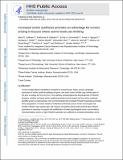Increased Serine Synthesis Provides an Advantage for Tumors Arising in Tissues Where Serine Levels Are Limiting
Author(s)
Sullivan, Mark Robert; Mattaini, Katherine Ruth; Dennstedt, Emily A; Nguyen, Anna; Sivanand, Sharanya; Reilly, Montana F.; Meeth, Katrina; Muir, Alexander; Darnell, Alicia; Bosenberg, Marcus W.; Lewis, Caroline A.; Vander Heiden, Matthew G.; ... Show more Show less
DownloadAccepted version (1.679Mb)
Publisher with Creative Commons License
Publisher with Creative Commons License
Creative Commons Attribution
Terms of use
Metadata
Show full item recordAbstract
Tumors exhibit altered metabolism compared to normal tissues. Many cancers upregulate expression of serine synthesis pathway enzymes, and some tumors exhibit copy-number gain of the gene encoding the first enzyme in the pathway, phosphoglycerate dehydrogenase (PHGDH). However, whether increased serine synthesis promotes tumor growth and how serine synthesis benefits tumors is controversial. Here, we demonstrate that increased PHGDH expression promotes tumor progression in mouse models of melanoma and breast cancer, human tumor types that exhibit PHGDH copy-number gain. We measure circulating serine levels and find that PHGDH expression is necessary to support cell proliferation at lower physiological serine concentrations. Increased dietary serine or high PHGDH expression is sufficient to increase intracellular serine levels and support faster tumor growth. Together, these data suggest that physiological serine availability restrains tumor growth and argue that tumors arising in serine-limited environments acquire a fitness advantage by upregulating serine synthesis pathway enzymes. Nutrient availability can constrain tumor growth. Sullivan et al. demonstrate that in some cancers, physiological levels of the amino acid serine are insufficient to support maximal tumor growth and that melanoma and breast tumors derive a growth advantage by upregulating serine biosynthesis.
Date issued
2019-06Department
Massachusetts Institute of Technology. Department of Biology; Koch Institute for Integrative Cancer Research at MITJournal
Cell Metabolism
Publisher
Elsevier BV
Citation
Sullivan, Mark R. et al. "Increased Serine Synthesis Provides an Advantage for Tumors Arising in Tissues Where Serine Levels Are Limiting." Cell Metabolism 29, 6 (June 2019): P1410-1421.e4 © 2019 Elsevier Inc
Version: Author's final manuscript
ISSN
1550-4131